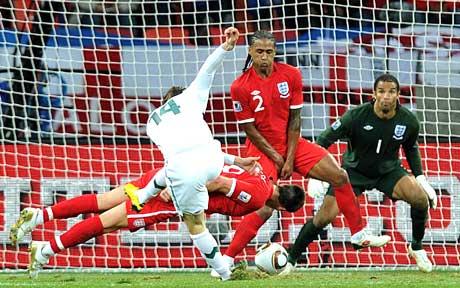
Brian Moore: intelligence and attitude help England confound the critics
It should not need a crisis to bring forth a performance commensurate with the rewards and talents possessed by the England football team, but whatever way they found the inspiration to beat Slovenia it was welcomed by millions of supporters, many of whom had feared the worst.

Bodies on the line: John Terry attempts to head away a shot late in the game
That England were not going to be as abjectly awful as in their first two group games was immediately apparent from the body language displayed when they arrived on the pitch in Port Elizabeth.
This performance exposed the supposed wisdom which has rained from all quarters on Fabio Capello for what it is — nonsense.
For a start, any system utilised by a team necessarily assumes it will be executed competently. When players do not pass, control or compete for the ball, it matters not what system is in place.
The material differences between Wednesday's and the previous games show that the definitive factor in how well England play is not what formation they adopt at the start of the game.
The much derided 4-4-2 system, continued by manager Fabio Capello, was used, as it should be, as an outline, not a commandment set in stone.
Throughout the game Wayne Rooney, Jermain Defoe and Steven Gerrard reacted to what was happening around them and altered their positioning from left to centre, occasionally right and back again.
As a result they presented easier targets for their midfield and pulled the Slovenian centre-backs all over the place.
This fluidity was augmented by something that was conspicuously absent against the United States and Algeria. Selfless runs were made by all the midfield players who, while knowing that a majority would not result in them receiving the ball, also knew they attracted defenders.
The above two facts meant that easier passes were available, more space was created and crucially in James Milner they, at last, had a wide player that could deliver the ball properly. The cliché that all defenders fear pace means little on its own. It might frighten fullbacks, but it does not cause a stir with central defenders if the ball sails harmlessly off target.
Further evidence of spirit within the England camp came from covering tackles by John Terry, Matthew Upson and Ashley Cole and late in the game when defenders threw their bodies in the way to block shots. In the previous two games you would have been pushed to see anyone run an extra inch for the cause.
A sober look at what England have done thus far has to record that they failed to top a relatively easy group and scored just twice. Nothing Capello's men have shown will cause angst for their forthcoming opponents.
It is difficult to predict confidently that England will build on a much improved performance, but the fact that they have recorded a win should not be underestimated.
They came into the Slovenia game with a welter of criticism, most of it justified, ringing in their ears and had heaped greater pressure on themselves than necessary. Victory means they will not have to contend with the psychological handicap of humiliation lurking at the back of their minds. If they do not progress further it will be hugely disappointing but not ignominious.
Forget about rigid systems; intelligence built on attitude is far more important.
Only those with excessive expectation will utterly condemn England if they go no further. The truth is that while talented, most of England's players are not truly world class and it was foolish to contend they were in the first place.
However, given that many England fans and much of its media seem not to concur, there may still be a lot of recrimination to come.
- Octopus Paul v Ahmadinejad [28/07]
- France suspend entire World Cup squ [24/07]
- Webb says World Cup final was taint [23/07]
- Goal-line technology off Fifa agend [20/07]
- World Cup final ball sold for £48K [18/07]
- Evra 'is being victimised', says Fe [17/07]
- Scolari says no offer yet to coach [16/07]
- Beckham: England players must take [15/07]
- Messi says WCup loss left him with [15/07]
- Now it's Brazil's turn to get ready [15/07]
| Years | Winners | Runner-up | Third place |
| 2006 | Italy | France | Germany |
| 2002 | Brazil | Germany | Turkey |
| 1998 | France | Brazil | Croatia |
| 1994 | Brazil | Italy | Sweden |
| 1990 | Germany | Argentina | Italy |
| 1986 | Argentina | Germany | France |
| 1982 | Italy | Germany | Poland |
| 1978 | Argentina | Holland | Brazil |
| 1974 | Germany | Holland | Poland |
| 1970 | Brazil | Italy | Germany |
| 1966 | England | Germany | Portugal |
| 1962 | Brazil | Czech | Chile |
| 1958 | Brazil | Sweden | France |
| 1954 | Germany | Hungary | Austria |
| 1950 | Uruguay | Brazil | Sweden |
| 1938 | Italy | Hungary | Brazil |
| 1934 | Italy | Czech | Germany |
| 1930 | Uruguay | Argentina | America |


